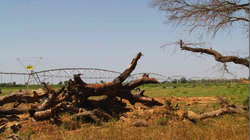Oakland Institute | 8 June 2011
MEDIA CONTACTS:
Liam O’Donoghue, [email protected], (415) 901-0111
Brad Tucker, [email protected], (212) 584-5000
Financial backers – including U.S universities and pension funds – are lured by high returns and turn a blind eye to theft of land, displacement of people
Oakland, CA – Hedge funds and other foreign speculators are increasing price volatility and supply insecurity in the global food system, according to a series of investigative reports released today by the Oakland Institute. The reports are based on the actual materials from these land deals and include investigation of investors, purchase contracts, business plans and maps never released before now.
The “Understanding Land Investment Deals in Africa” reports also reveal that these largely unregulated land purchases are resulting in virtually none of the promised benefits for native populations, but instead are forcing millions of small farmers off ancestral lands and small, local food farms in order to make room for export commodities, including biofuels and cut flowers.
“The same financial firms that drove us into a global recession by inflating the real estate bubble through risky financial maneuvers are now doing the same with the world’s food supply,” said Anuradha Mittal, executive director of the Oakland Institute. “In Africa this is resulting in the displacement of small farmers, environmental devastation, water loss and further political instability such as the food riots that preceded the Tunisian and Egyptian revolutions.”
Mittal added that for people living in developed countries, the conversion of African small farms and forests into a natural-asset-based, high-return investment strategy can drive up food prices and increase the risks of climate change.
“The research exposed investors who said it’s easy to make a land deal – that they could usually get what they want in exchange for giving a poor, tribal chief a bottle of Johnny Walker,” Mittal said. “When these investors promise progress and jobs to local chiefs, it sounds great – but they don’t deliver, which means no progress and relocating people from their homes.”
New reports and materials on these deals examine on-the-ground implications in several African nations including Ethiopia, Mali, Sierra Leone, Mozambique, Tanzania and South Sudan – and expose contracts that connect land grabs back to institutional investors in these nations and others. In addition to publicly sharing – for the first time -- the paperwork behind these deals, the reports demonstrate how common land grabs are and how quickly this phenomenon is taking place. Investors in these deals include not only alternative investment firms like Emergent Asset Management – that works to attract speculators, but also universities including Harvard, Spellman and Vanderbilt.
Contracts also reveal a bonanza of incentives for speculators ranging from unlimited water rights to tax waivers.
“No one should believe that these investors are there to feed starving Africans, create jobs or improve food security, Obang Metho of Solidarity Movement for New Ethiopia said. “These land grab agreements – many of which could be in place for 99 years – do not mean progress for local people and will not lead to food in their stomachs. These deals lead only to dollars in the pockets of corrupt leaders and foreign investors.”
In 2009 alone nearly 60 million hectares – an area the size of France – was purchased or leased in these land grabs. Most of these deals are characterized by a lack of transparency, despite the profound implications posed by the consolidation of control over global food markets and agricultural resources by financial firms.
“We have seen cases of speculators taking over agricultural land while small farmers, viewed as “squatters” are forcibly removed with no compensation,” said Frederic Mousseau, policy director at the Oakland Institute. “This is creating insecurity in the global food system that could be a much bigger threat to global security than terrorism. More than one billion people around the world are living with hunger. The majority of the world’s poor still depend on small farms for their livelihoods, and speculators are taking these away while promising progress that never happens.”
These reports, as well as briefs on other aspects of land grabs, are available at http://media.oaklandinstitute.org.
###
The Oakland Institute is an independent policy think tank whose mission is to increase public participation and promote fair debate on critical social, economic, and environmental issues (www.oaklandinstitute.org).

























